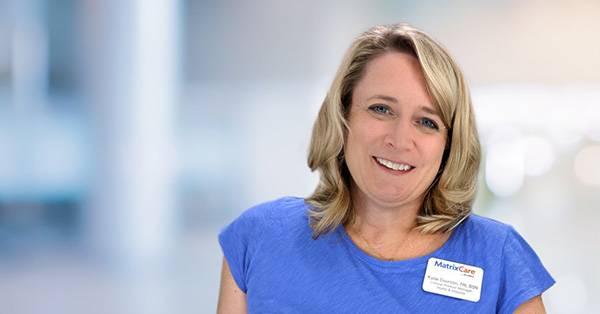- Solutions
- Solutions
- Home Health
- Hospice
- Life Plan Community
- Palliative Care
- Private Duty
- Senior Living
- Skilled Nursing
- Skilled Nursing
- Skilled Nursing Software
- Advanced Insights
- Customer relationship management
- Data and analytics
- Financial & operations management
- Marketing
- Nutrition management
- Referral management
- Regulatory compliance
- Retail management
- Resident engagement
- Revenue cycle management
- Skilled nursing interoperability
- Partners
- Blogs
- Resources
- About
- User Conference

How to bill Medicare Advantage plans in home health and hospice
Medicare Advantage plans have become an increasingly popular choice among the nation’s seniors. In fact, there were 3,834 Medicare Advantage plans available nationwide for individual enrollment in 2022. According to KFF, that’s up 8 percent (284 more plans) from 2021 and the largest number of plans in more than a decade. So, what’s the catch? Medicare Advantage plans work differently from Original Medicare (Parts A and B), and that difference can impact Medicare reimbursement for home health and hospice agencies. Here are common pitfalls in billing Medicare Advantage and tips to help you avoid them.
What is Medicare Advantage and how is it different from Original Medicare?
Medicare Advantage (MA) plans, also known as Part C, are Medicare-approved plans from private health insurance companies. They offer more benefits than Original Medicare (Part A and Part B) and help pay for services Original Medicare doesn’t cover, and that makes them a very popular choice among seniors.
All MA plans include Medicare Part A (inpatient hospital coverage) and Part B (outpatient medical coverage). Most also come bundled with dental, vision and hearing benefits — services Original Medicare doesn’t cover. Many MA plans also include Part D prescription drug benefits and perks like free gym memberships, discounts on healthy foods and access to a variety of wellness programs.
Unlike Original Medicare, where seniors can see any doctor they choose, MA plans have provider networks that vary in size from narrow to broad. Subscribers pay less when services are received within the plan’s network and pay more for services received outside the network.
MA plans also provide a level of financial protection that Original Medicare doesn’t. MA plans cap how much subscribers pay out of their own pocket each year. Original Medicare places no cap on annual out-of-pocket costs.
Monthly premiums for MA vary by plan and the level of benefits provided. Many companies offer a range of plans with premiums that start at $0 a month. No matter which MA plan or premium they choose, subscribers must continue to pay their monthly Part B premiums plus the monthly plan premium.
How Medicare Advantage impacts reimbursement
Given their increasing popularity, it’s likely that MA plans are here to stay. So, it’s important to understand and get ahead of the reimbursement challenges they pose for home health and hospice agencies:
- Notice of Admissions (NOA): Starting January 1, 2022, Original Medicare guidelines required home health agencies submit NOA within five days from the start of care. But private MA payors provided no such direction, leaving many agencies struggling to obtain final payment when NOAs weren’t in place within the five-day rule.
- Health Insurance Prospective Payment System (HIPPS) rate codes: These codes represent specific sets of patient characteristics payors use to make payment determinations during claims processing. This is typically documented as part of the OASIS process. Original Medicare can access the state database where OASIS HIPPS codes are stored to determine validity during final claims processing. MA payors don’t have access to this database and can’t see the actual OASIS HIPPS, so they pay using the generic HIPPS which often results in underpayment to home health and hospice agencies.
- Appeals and recoupments: Original Medicare has a 14-day turnaround from the time you submit a final, accurate claim. This ensures agencies receive proper, timely payment and aren’t underpaid. But with the frequency of underpayment from private MA payors, agencies must appeal to receive full payment for services. In the case of recoupment, private payors often require the patient’s full medical record for review, which takes time and further delays full payment to the agency.
- Authorizations: One of the biggest differences between Original Medicare and Medicare Advantage is authorization. Original Medicare doesn’t require authorization, but most MA payors require agencies to obtain authorization before treating the patient. This often results in reduced payment — or in some cases no payment — when authorizations aren’t obtained upfront. In this case, agencies can appeal for medical necessity but again, it will likely take time to get your money.
Tips for billing and coding Medicare Advantage
There’s a lack of consistency across MA payors when it comes to billing requirements and claims processing. This makes it challenging and time-consuming for agencies to track down and resolve issues that result in unpaid claims or reduced payment. Following these tips can help ensure full and timely payment to your agency:
- Know MA payors and requirements. Get to know the different MA payors and their billing rules and expectations. This is a critical step that can save your staff the time of following up with reps over the phone to figure out requirements and reduce appeals for full payment.
- Access payor portals. Familiarize yourself with the different payor portals and know how they work. How do you remit electronically? Where can you find a recoupment letter? This can be the fastest way to get information, and the sooner you know about issues the sooner you can resolve them. Payor portals help keep you on top of claims, issues and reviews. They also may be the easiest way to communicate directly with payors.
- Follow the NOA five-day rule. Don’t wait to find out if an MA payor requires NOA within five days of the start of care or not. Stay on the safe side and submit an NOA or RAP for every payor. Making it routine practice will save you the time and effort of appeals and recoupments down the road so you can get your money faster.
- Determine the need for authorization up front. When you find out a patient has Medicare Advantage, immediately find out if you need to obtain authorization before treatment.
- Follow up on MA claims. Stay on top of payors and check the status of final claims within 15 days to make sure the payor received it and is processing payment. This is a good way to nip any issues in the bud and keep AR from aging out.
- Look for patterns. Typically, anything that’s happened three times is a pattern. If you’ve been underpaid three times, don’t let it go on. Contact your payor representative to address the issue and get help to resolve it.
RCM experts can help
We have the RCM trifecta you need — the people, the processes and the technology. We hire certified home health coders (much different than standard medical coding) and have a full regulatory compliance staff.
We’re always in tune with current and upcoming payors and regulations to help set your agency up for success. What really sets us apart are the things we see that you might not. Things like ongoing eligibility and authorizations, payor set-up, contract reviews, and EMR relationships. We take control of the small stuff to help you save time and get paid faster.
Request a consultation for a closer look at MatrixCare.
See what MatrixCare can do for you
Nancy Cary
Nancy possesses a wide range of experience in the Home Health and Hospice field, including direct involvement in managing various aspects of the revenue cycle such as intake, authorizations, medical records, accounts receivable, and other related positions within Home Care and Hospice agencies. As a Senior Implementation Consultant, Nancy has successfully overseen complex software implementations for McKesson and Netsmart Home Health and Hospice. Her expertise extends to working with payors, particularly Medicare, and she is highly knowledgeable in the specific billing rules and regulations pertaining to Home Health and Hospice.
Before assuming her current managerial role, Nancy served as an A/R Consultant in the Revenue Cycle Division of HEALTHCAREfirst. In this capacity, she utilized her skills and knowledge to implement RCM services for unique and large clients, as well as assisting customers in resolving intricate A/R and billing issues. Nancy's notable strengths lie in her exceptional ability to train, develop, and efficiently manage effective teams.
Related Posts



See MatrixCare in action
Start by having a call with one of our experts to see our platform in action.
MatrixCare offers industry-leading software solutions. Thousands of facility-based and home-based care organizations trust us to help them improve efficiency and provide exceptional care.





